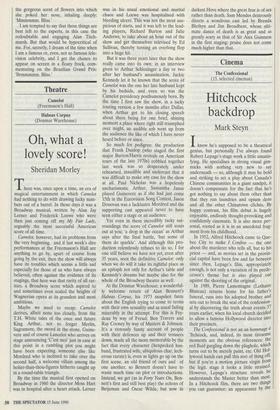Theatre
Camelot (Freemason's Hall) Habeas Corpus (Donmar Warehouse)
Oh, what a lovely score!
Sheridan Morley
There was, once upon a time, an era of magical entertainment in which Camelot had nothing to do with drawing lucky num- bers out of a barrel. In those days it was a Broadway musical, written by Alan Jay Lerner and Frederick Loewe who were then just coming off my My Fair Lady, arguably the most successful American score of all time.
Camelot, however, had its problems from the very beginning, and if last week's dire performances at the Freemason's Hall are anything to go by, apart of course from going by the exit, then the show will always have its troubles which seems a little sad especially for those of us who have always believed, often against the evidence of its stagings, that here was that rarity of all rar- ities, a Broadway score which aspired to and sometimes even scaled the heights of Wagnerian opera at its grandest and most ambitious.
Maybe we need to recap: Camelot derives, albeit none too closely, from the T.H. White tales of the once and future King Arthur, not to forget Merlin, Sagramore, the sword in the stone, Guine- vere and of course Lancelot who arrives on stage announcing 'C'est moi' just in case at this point in a rambling plot you might have been expecting someone else like Mordred who is inclined to take over the second half, a welcome villain among the holier-than-thou-figures hitherto caught up in a round-table triangle.
By the time the musical first opened on Broadway in 1960 the director Moss Hart was in hospital after a heart attack. Lerner was in his usual emotional and marital chaos and Loewe was hospitalised with bleeding ulcers. This was not the most aus- picious of starts, and it was left to the lead- ing players, Richard Burton and Julie Andrews, to take about an hour out of the show and get themselves televised by Ed Sullivan, thereby turning an overlong flop into a huge hit.
But it was three years later that the show really came into its own: in an interview given to Arthur Schlesinger a day or two after her husband's assassination, Jackie Kennedy let it be known that the score of Camelot was the one her late husband kept by his bedside, and even so was the Camelot presidency posthumously born. By the time I first saw the show, in a tacky touring version a few months after Dallas, when Arthur got to his closing speech about there being for one brief, shining moment a place where right still triumphed over might, an audible sob went up from the audience the like of which I have never heard before or since.
So much for pedigree: the production that Frank Dunlop (who staged the first major Burton/Harris revivals on American tours of the late 1970s) cobbled together last week was so desperately under rehearsed, inaudible and undercast that it was difficult to make any case for the show at all. Paul Nicholas was a hopelessly uncharismatic Arthur, Samantha Janus played Guinevere as if she had just come 15th in the Eurovision Song Contest, Jason Donovan was a lacklustre Mordred and the supporting cast appeared never to have seen either a stage or an audience.
Yet even in these incredibly tacky sur- roundings the score of Camelot still soars out at you; 'a drop in the ocean' as Arthur says after the final battle, 'but some of them do sparkle'. And although this pro- duction relentlessly refuses to do so, I for one still believe we have not yet, even after 35 years, seen the definitive Camelot: only when we do will it take its rightful place as an epitaph not only for Arthur's table and Kennedy's dreams but maybe also for the whole of the Broadway theatre as well.
At the Donmar Warehouse; a wonderful- ly welcome return of Alan Bennett's Habeas Corpus, his 1973 snapshot farce about the English trying to come to terms with their own sexuality and as usual failing miserably in the attempt. For this is Fey- deau by way of Freud; Ben Travers and Ray Cooney by way of Masters & Johnson. It's a riotously funny account of people with their defences up and their trousers down, made all the more memorable by the fact that every character (henpecked hus- band, frustrated wife, ubiquitous char, lech- erous curate) is, even as lights go up on the first scene, an old friend of ours and of one another, so Bennett doesn't have to waste much time on plot or introductions. Instead, we get (as in Forty Years On, Ben- nett's first and still best play) the echoes of Betjeman and Oscar Wilde, but now in darkest Hove where the great fear is of sex rather than death. Sam Mendes dextrously directs a wondrous cast led by Brenda Blethyn and Jim Broadbent, whose ulti- mate dance of death is as great and as greatly scary as that of Sir Alex Guinness in the first staging: praise does not come much higher than that.


































































 Previous page
Previous page